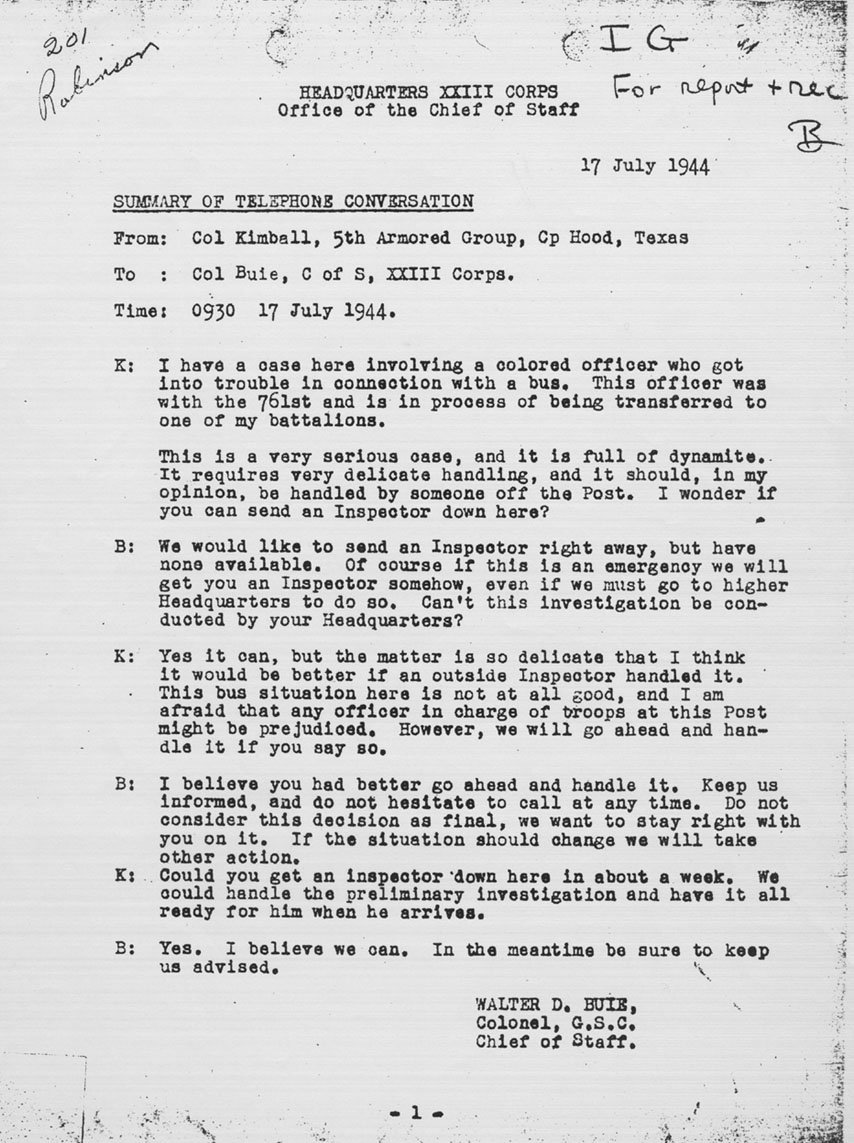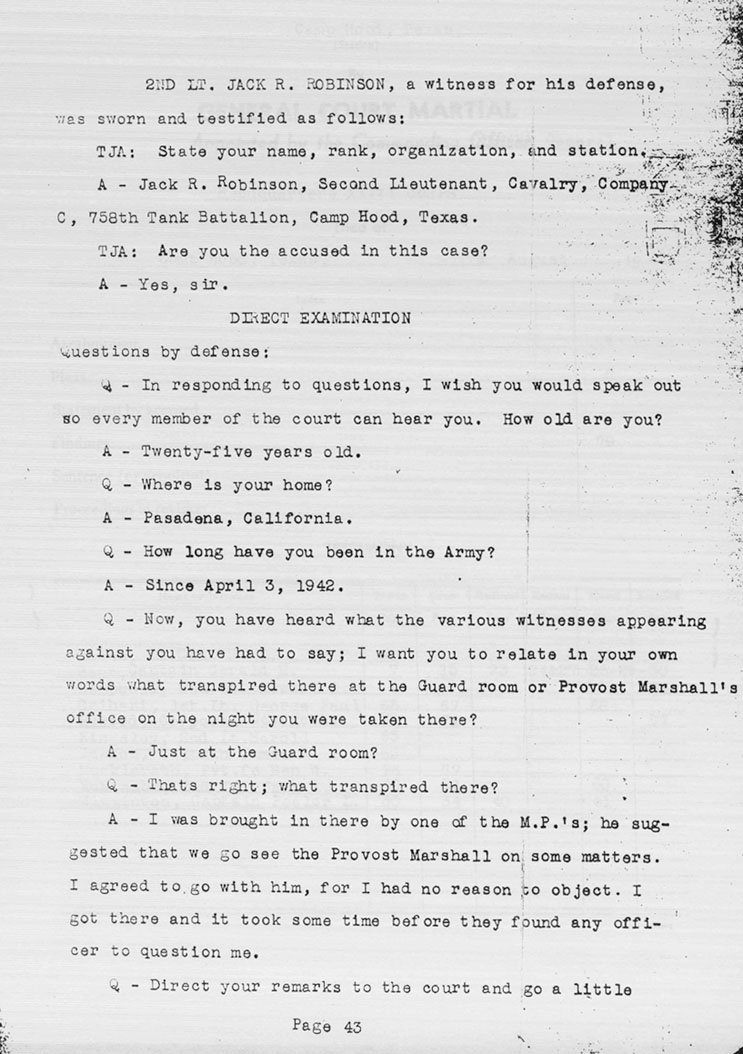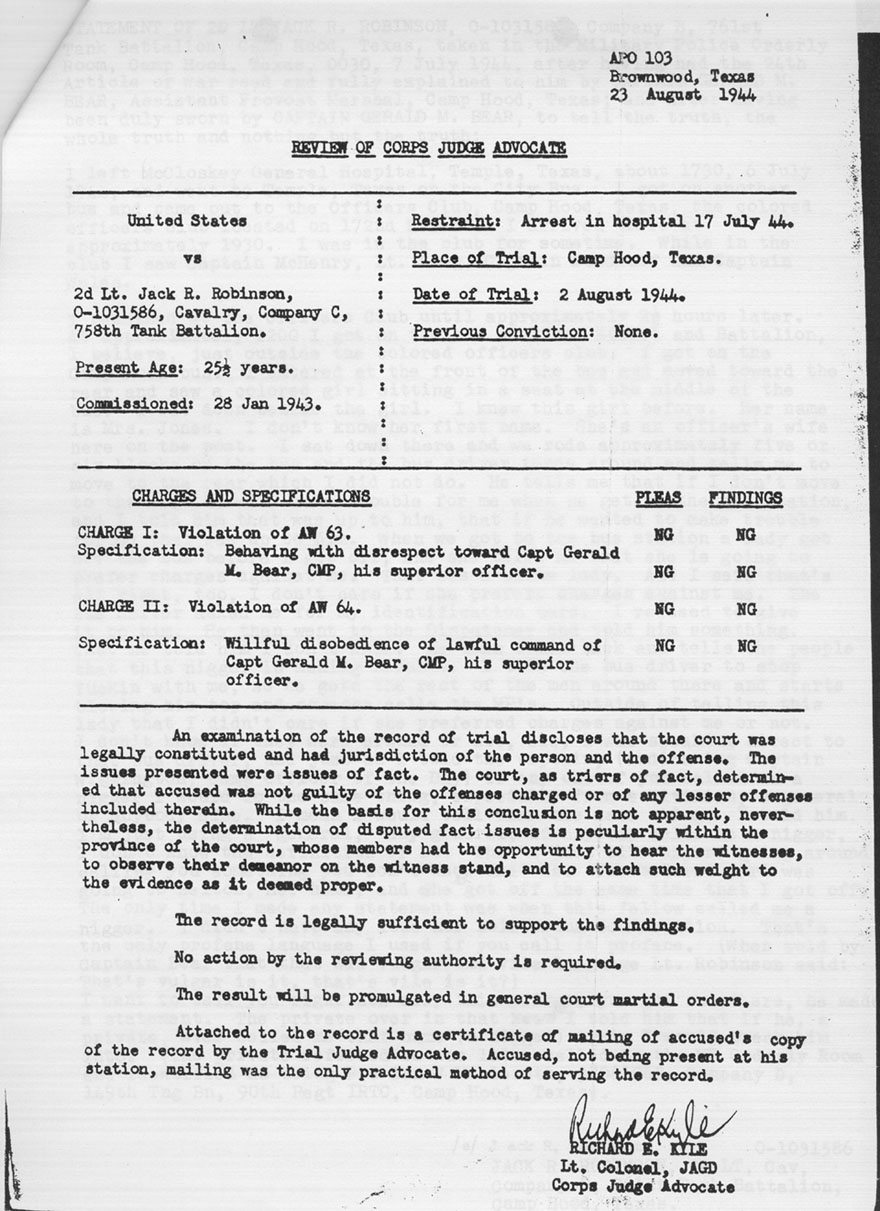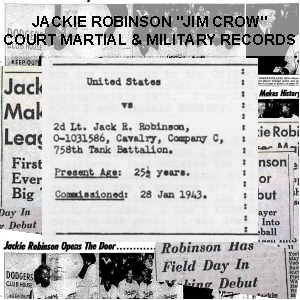|
This Official Military Personnel File includes records from the following folders: Service Documents (March 1942-October 1945); Field File/Jacket or Record Book (April 1942-February 1943); Correspondence (August 1944-June 1958); Disciplinary (July 1944-August 1944); Medical Records (April 1942-August 1951).
Also included is an article from Prologue, the magazine of the National Archives and Records Administration, covering his court martial.
In 1944 a young African American Army officer, the yet to become famous Jackie Robinson, was attached to an all-black unit at Camp Hood in Texas. Robinson, eleven years before the world would come to know Rosa Parks, was subjected to a general court-martial related to events surrounding resisting usual southern protocol and refusing to move to the back of the bus on a military post when directed by the driver to do so. In three years he would be the most famous African American in the country when he becomes the first black man to play major league baseball in the modern era of the sport. However, at this time Second Lieutenant Jack Roosevelt Robinson was facing military justice in a segregated army in obscurity.
On April 3, 1942 Jackie Robinson was inducted into the U.S. Army. Two years earlier the army only had five black officers, three of them were in the Chaplin Corps.
Robinson was assigned to Fort Riley, Kansas. He was promoted to corporal and distinguished himself on the firing range, he became a commissioned officer after meeting and becoming friendly with boxing heavyweight champion Joe Louis. Robinson and other black soldiers hoping to become officers had informed Louis that no African Americans were ever admitted to officer candidates' school at Fort Riley. Using his influence with the secretary of war's civilian aide, Truman Gibson, himself black, Louis quietly had the situation investigated. In January 1943 Robinson and several other African Americans were commissioned second lieutenants.
Lieutenant Robinson, as a platoon leader soon made it a point to strenuously object to many of the segregated practices at Fort Riley. He once got into a shouting match with a white major over whether black soldiers deserved fuller access to the fort's post exchange (PX). Although an athlete as a student at UCLA and semi-pro football player before entering the army, Robinson refused to play football for Fort Riley because he was not allowed to play on its whites only baseball team. When his commanding officer reminded Lieutenant Robinson that he could be ordered to play, Robinson agreed that was so, but remarked that he could not be ordered to play well.
In early 1944 Robinson was reassigned to Camp Hood, located about 40 miles southwest of Waco, Texas. Robinson was attached to a black tank unit, the 761st Tank Battalion, which later distinguished itself in the European theater's Battle of the Bulge. Camp Hood was a posting many African Americans hated, given the racial climate there. Camp Hood had already earned a dismal reputation among black officers and enlisted men, not only because of complete segregation on the post but also because neighboring towns such as Killeen and Temple were unfriendly to black soldiers. These mostly farming communities were replete with hard-core racists eager to enforce regional racial norms when dealing with unwary black soldiers who might think present military status transcended time-honored racial etiquette.
A difficulty for black soldiers stationed at many of the southern training camps was when civilian bus lines held the contract for transporting soldiers both on and off the posts. More than a year before Robinson's bus encounter took place, a friend of the civilian aide Gibson commented on Camp Hood's extreme case. In his letter, he described the camp as "one of the worst situations in the whole AUS [Army of the United States]" and went on to remark, "There is hostility between [military police and black personnel] and segregation on interstate buses operating on the post, and segregation in the post facilities and theaters."
On July 6, 1944, as he was returning that evening to the hospital, Southwestern Bus Company driver Milton Reneger brusquely instructed the lieutenant to move to a seat farther back from the one where he sat next to a fellow officer's light-skinned wife. Robinson, perhaps conscious of being an officer suggested that the driver tend to driving instead. Robinson's sharpness of response may have been at least partially attributable to recollection of previous bus incidents at Hood and other installations regarding what blacks saw as a pattern of unfairness.
One of the 761st's officers remembered, "There were so many problems with the bus situation that battalion commanders and the company commanders almost let us have trucks at will to go to the town . . . rather than mess with what went on with the bus."(1)
Later, at his stop, Robinson and the driver continued to argue, joined by the bus dispatcher, Beverly Younger, who casually referred to Robinson in his presence as "a 'n----r'." When military policemen arrived at the scene, a crowd of indignant whites, both civilian and military, had formed, adding to turmoil and confusion. The MPs on site, none of whom outranked the lieutenant, asked him to go with them to the police headquarters to straighten out the situation. He agreed to do so. However, when they arrived at the station to meet with the camp's assistant provost marshal, a white MP ran up to the vehicle and excitedly inquired if they had "the "n----r" lieutenant" with them. The utterance of this unexpected and especially offensive racial epithet served to set Robinson off and he threatened "to break in two" anyone, whatever their rank or status, who employed that word.
Robinson's reaction lead to a court martial on five charges including, "a violation of Article of War No. 63, behaving with disrespect toward Capt. Gerald M. Bear, CMP, his superior officer,' and a charge of violation of Article No. 64, willful disobedience of lawful command of Gerald M. Bear, CMP, his superior." The three other charges were dropped before the trial began.
The case against him, The United States v. 2nd Lieutenant Jack R. Robinson, was heard by nine men, one was black, with six votes needed for acquittal. By the time of the hearing, the charges against Robinson were all for his alleged misbehavior at the station, after the incident on the bus. He was accused of disrespect to a superior officer, and of disobeying orders. Most of the witnesses' testimony ran counter to Robinson's account of events, but inconsistencies appeared in their stories under cross-examination.
The defense called a series of character witnesses. All of Jackie's superior officers, who were white, testified that in their unit, Robinson was "held in high regard." Robinson's colonel testified that he would be satisfied going into combat with Robinson under him.
Jackie himself took the witness stand and offered an inspired explanation of his angry reaction at being called a "n----r". "My grandmother was a slave. She told me a "n----r" was a low, uncouth person, and pertains to no one in particular; but I don't consider that I am low and uncouth. I am a Negro, but not a "n----r"."
In summing up, the defense insisted to the panel that the case involved no violations as charged but was "simply a situation in which a few individuals sought to vent their bigotry on a Negro they considered 'uppity' because he had the audacity to seek to exercise rights that belonged to him as an American and as a soldier."
Robinson received enough votes from the panel to be found not guilty.
(1) Prologue Magazine Spring 2008, Vol. 40, No. 1
|



